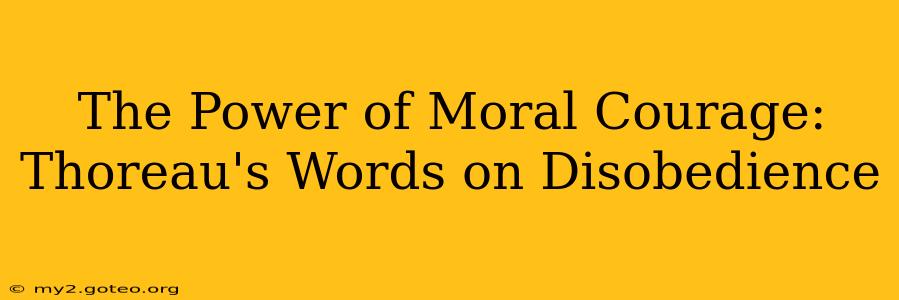Henry David Thoreau's essay, "Civil Disobedience," remains a cornerstone of philosophical and political thought, resonating powerfully even today. More than just a historical document, it's a timeless exploration of individual conscience and the moral imperative to resist unjust laws. Thoreau's potent words continue to inspire activists and thinkers, urging us to examine our relationship with authority and the importance of standing up for what we believe is right, even in the face of adversity. This essay delves into the core tenets of Thoreau's philosophy and its enduring relevance in the modern world.
What is Civil Disobedience, According to Thoreau?
Thoreau's concept of civil disobedience isn't about anarchy or violence. Instead, it's a deliberate and conscientious refusal to comply with unjust laws. He argued that individuals have a moral obligation to disobey laws that violate their conscience, even if it means facing legal consequences. This act of disobedience, however, isn't arbitrary; it's rooted in a deep-seated belief in justice and a commitment to living a life aligned with one's moral principles. The key element is the moral aspect – the conviction that the law is fundamentally wrong.
Why is Civil Disobedience Important?
The importance of civil disobedience lies in its potential to challenge oppressive systems and promote social change. By refusing to participate in injustice, individuals can expose its flaws and create pressure for reform. Thoreau believed that a government that unjustly imprisons its citizens loses its legitimacy. The act of disobedience, even if it leads to imprisonment, can be a powerful statement against injustice and a catalyst for broader societal reflection and change.
What are the potential consequences of civil disobedience?
Thoreau himself experienced the consequences of his civil disobedience, spending a night in jail for refusing to pay a poll tax he viewed as supporting slavery. While consequences can range from fines and imprisonment to social ostracism, the potential rewards – the advancement of justice and human rights – often outweigh the risks for those deeply committed to their cause. This is where moral courage comes in: the willingness to accept these consequences for the sake of a higher principle.
What are some examples of civil disobedience in history?
History is replete with examples of civil disobedience, demonstrating its effectiveness as a tool for social change. The American Civil Rights Movement, with its sit-ins, marches, and boycotts, stands as a powerful testament to the impact of collective civil disobedience. Similarly, the anti-apartheid movement in South Africa and the women's suffrage movement both employed civil disobedience to achieve significant social and political reforms. These examples show the power of collective action inspired by Thoreau's philosophy.
How does Thoreau’s philosophy relate to modern social movements?
Thoreau's ideas remain strikingly relevant to modern social movements. From climate activists engaging in civil disobedience to protest environmental destruction to those fighting for racial justice and LGBTQ+ rights, individuals and groups continue to utilize nonviolent resistance inspired by Thoreau's philosophy. His emphasis on individual conscience and the moral responsibility to challenge injustice continues to fuel movements striving for a more just and equitable world.
Is it ever right to disobey the law?
This is the core question that Thoreau's essay addresses. His answer is a nuanced one: it is morally imperative to disobey unjust laws. However, the determination of what constitutes an "unjust law" is a matter of individual conscience and requires careful consideration. It's not a call for arbitrary lawlessness, but a call for responsible and thoughtful resistance against systems that actively violate fundamental human rights or principles of justice.
What are some criticisms of Thoreau’s ideas on civil disobedience?
Critics of Thoreau's ideas point to the potential for chaos and instability if widespread civil disobedience were to occur. Some argue that it undermines the rule of law and that it may not be effective in all situations. However, Thoreau's emphasis on nonviolent resistance is crucial here. He didn't advocate for violence or anarchy; his focus was on peaceful, conscientious resistance as a means to bring about positive social change.
In conclusion, Thoreau's "Civil Disobedience" is not merely a historical artifact; it's a living document that continues to inspire individuals and movements striving for a more just and ethical world. His enduring message emphasizes the critical importance of moral courage, the responsibility of the individual conscience, and the power of nonviolent resistance in challenging unjust systems and paving the way for meaningful societal transformation.

